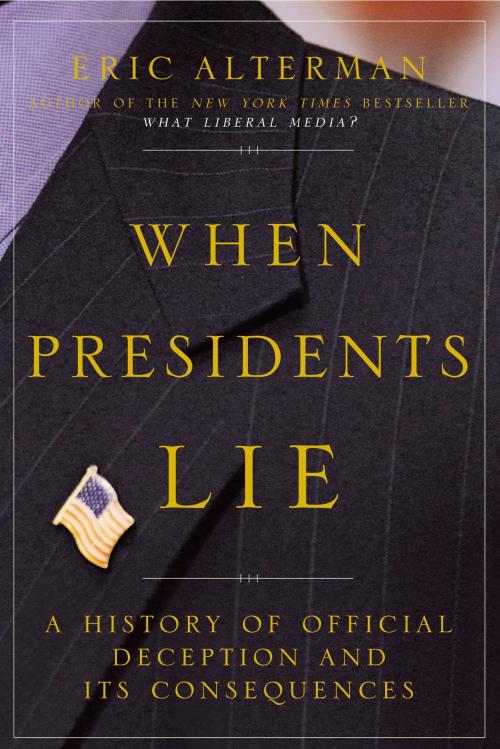When Presidents Lie
A History of Official Deception and Its Consequences
Nonfiction, Social & Cultural Studies, Political Science, Politics, Practical Politics, History & Theory, History, Americas, United States| Author: | Eric Alterman | ISBN: | 9781101158876 |
| Publisher: | Penguin Publishing Group | Publication: | September 23, 2004 |
| Imprint: | Penguin Books | Language: | English |
| Author: | Eric Alterman |
| ISBN: | 9781101158876 |
| Publisher: | Penguin Publishing Group |
| Publication: | September 23, 2004 |
| Imprint: | Penguin Books |
| Language: | English |
“I’ve never read a better explanation of why presidents lie.”—John W. Dean, former counsel to President Nixon, The Washington Monthly
By the end of the twentieth century, after decades of demoralizing revelations about the mendacity of their elected officials, most Americans had come to accept the fact that deception was not only an accepted practice in government but also pervasive. Whatever the reasons proposed to justify falsehoods—practicality, expediency, extraordinary conditions of wartime—the ability to lie convincingly had come to be regarded as almost being a qualification for holding public office. Although such behavior has come to be tolerated, little accounting has been taken of the effects of this institutionalized dishonesty in our political culture.
When Presidents Lie: A History of Official Deception and Its Consequences addresses its subject not from a moral perspective, but from a pragmatic one, and discovers that in the end, honesty in government is, in fact, the best policy. Journalist and historian Eric Alterman’s meticulous research is drawn from primary-source materials, both government documents and the media reactions to the unfolding dramas, and demonstrates how these lies returned to haunt their tellers, or their successors, destroying the very policy the lie had been intended to support. Without exception, each of the presidents paid a high price for deception. So, too, did the nation.
This is history at its most compelling, a balanced, eloquent, and revelatory chronicle of presidential dishonesty and its incalculable costs. In the fundamental questions it raises about leadership, accountability, and democracy, it is required reading for anyone who is concerned about America’s past—or her future.
“I’ve never read a better explanation of why presidents lie.”—John W. Dean, former counsel to President Nixon, The Washington Monthly
By the end of the twentieth century, after decades of demoralizing revelations about the mendacity of their elected officials, most Americans had come to accept the fact that deception was not only an accepted practice in government but also pervasive. Whatever the reasons proposed to justify falsehoods—practicality, expediency, extraordinary conditions of wartime—the ability to lie convincingly had come to be regarded as almost being a qualification for holding public office. Although such behavior has come to be tolerated, little accounting has been taken of the effects of this institutionalized dishonesty in our political culture.
When Presidents Lie: A History of Official Deception and Its Consequences addresses its subject not from a moral perspective, but from a pragmatic one, and discovers that in the end, honesty in government is, in fact, the best policy. Journalist and historian Eric Alterman’s meticulous research is drawn from primary-source materials, both government documents and the media reactions to the unfolding dramas, and demonstrates how these lies returned to haunt their tellers, or their successors, destroying the very policy the lie had been intended to support. Without exception, each of the presidents paid a high price for deception. So, too, did the nation.
This is history at its most compelling, a balanced, eloquent, and revelatory chronicle of presidential dishonesty and its incalculable costs. In the fundamental questions it raises about leadership, accountability, and democracy, it is required reading for anyone who is concerned about America’s past—or her future.















